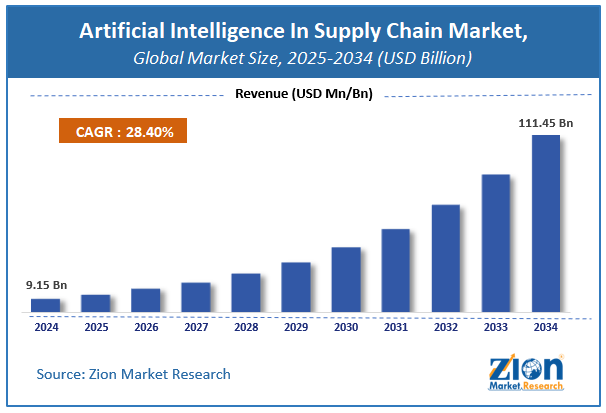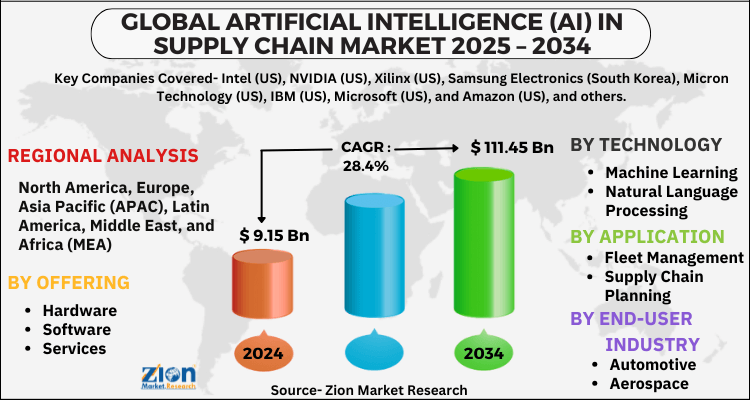Global Artificial Intelligence (AI) In Supply Chain Market Size, Share, Forecast 2034

Artificial Intelligence (AI) In Supply Chain Market By Offering (Hardware, Software, Services), By Technology (Machine Learning, Natural Language Processing, Context-aware Computing, Computer Vision), Application (Fleet Management, Supply Chain Planning, Warehouse Management, Virtual Assistant, Risk Management, Freight Brokerage, Others), End-user Industry (Automotive, Aerospace, Manufacturing, Retail, Healthcare, Consumer-packaged Goods ,Food and Beverages, Others), and By Region: Global and Regional Industry Overview, Market Intelligence, Comprehensive Analysis, Historical Data, and Forecasts 2025 - 2034
| Market Size in 2024 | Market Forecast in 2034 | CAGR (in %) | Base Year |
|---|---|---|---|
| USD 9.15 Billion | USD 111.45 Billion | 28.4% | 2024 |
Artificial Intelligence (AI) In Supply Chain Market: Industry Perspective
The global artificial intelligence (AI) in supply chain market size was worth around USD 9.15 Billion in 2024 and is predicted to grow to around USD 111.45 Billion by 2034 with a compound annual growth rate (CAGR) of roughly 28.4% between 2025 and 2034. The report analyzes the global artificial intelligence (AI) in supply chain market's drivers, restraints/challenges, and the effect they have on the demands during the projection period. In addition, the report explores emerging opportunities in the artificial intelligence (AI) in supply chain industry.
Artificial Intelligence (AI) In Supply Chain Market: Overview
Artificial intelligence (AI) is a technology that allows machines, software, and systems to compete in some ways with human intelligence and behaviour. The heart of AI is a system that analyses data and performs various jobs using complex algorithms. Data extraction, data analysis, supply and demand forecasting, and the operation of autonomous vehicles are just a few of the applications it has in the supply chain. It can also gain access to warehouse procedures in order to optimise product shipping, receiving, storing, picking, and management. The improvement of logistics is accomplished through optimising warehousing and distribution processes.
By employing cognitive predictions and recommendations on optimal actions, artificial intelligence in supply chain helps to improve overall supply chain performance. The increasing digitization of economies, particularly emerging nations, will emerge as a major market development driver. The the increasing generation of large amounts of data and information for greater visibility and transparency in supply chain and logistics data, rising adoption by small and medium-sized businesses, and the strengthening IT industry in developing economies such as India and China, will exacerbate the market's growth. Other factors boosting the market's growth include the rapid prevalence of cloud-based services and an ever-growing set of favourable government laws.
Key Insights
- As per the analysis shared by our research analyst, the global artificial intelligence (AI) in supply chain market is estimated to grow annually at a CAGR of around 28.4% over the forecast period (2025-2034).
- Regarding revenue, the global artificial intelligence (AI) in supply chain market size was valued at around USD 9.15 Billion in 2024 and is projected to reach USD 111.45 Billion by 2034.
- The artificial intelligence (AI) in supply chain market is projected to grow at a significant rate due to increasing need for enhanced supply chain visibility, efficiency, and resilience in the face of growing complexities and disruptions.
- Based on Offering, the Hardware segment is expected to lead the global market.
- On the basis of Technology, the Machine Learning segment is growing at a high rate and will continue to dominate the global market.
- Based on the Application, the Fleet Management segment is projected to swipe the largest market share.
- By End-user Industry, the Automotive segment is expected to dominate the global market.
- Based on region, North America is predicted to dominate the global market during the forecast period.
Artificial Intelligence (AI) In Supply Chain Market: Growth Drivers
Computer vision is ready to create an impact on global artificial intelligence to drive global market growth
The use of computer vision technology in supply chain activities across several industrial verticals is fast rising. During the 2022-2028, this category is expected to increase at the fastest rate. Many end-use industries throughout the world have begun to incorporate computer vision as a revolutionary technology into their operations. Soaring labour costs, more awareness of the benefits of AI solutions, increased demand for anti-theft solutions, and the availability of affordable robotics/automation are some of the primary factors driving the computer vision technologies segment's quickest growth.
Artificial Intelligence (AI) In Supply Chain Market: Restraints
System Complexities will act as growth to hamper the market growth
AI systems are typically cloud-based, which necessitates a large amount of bandwidth to fuel the system. Operators may also require specialized gear to access AI capabilities, and the cost of AI-specific technology can be too expensive for many supply chain partners.
Artificial Intelligence (AI) In Supply Chain Market: Challenges
The operational costs involved may give rise to challenges for its growth
Each of the various processors in an AI-controlled machine needs maintenance and replacement from time to time. The problem is that the operating investment could be rather large due to the prospective cost and energy involved. Manufacturers would also have to replace these, which would raise utility bills and have a direct influence on operating costs.
Artificial Intelligence (AI) In Supply Chain Market: Segmentation Analysis
The global artificial intelligence (AI) in supply chain market is segmented based on Offering, Technology, Application, End-user Industry, and region.
Based on Offering, the global artificial intelligence (AI) in supply chain market is divided into Hardware, Software, Services.
On the basis of Technology, the global artificial intelligence (AI) in supply chain market is bifurcated into Machine Learning, Natural Language Processing, Context-aware Computing, Computer Vision.
By Application, the global artificial intelligence (AI) in supply chain market is split into Fleet Management, Supply Chain Planning, Warehouse Management, Virtual Assistant, Risk Management, Freight Brokerage, Others.
In terms of End-user Industry, the global artificial intelligence (AI) in supply chain market is categorized into Automotive, Aerospace, Manufacturing, Retail, Healthcare, Consumer-packaged Goods ,Food and Beverages, Others.
Artificial Intelligence (AI) In Supply Chain Market: Report Scope
| Report Attributes | Report Details |
|---|---|
| Report Name | Artificial Intelligence (AI) In Supply Chain Market |
| Market Size in 2024 | USD 9.15 Billion |
| Market Forecast in 2034 | USD 111.45 Billion |
| Growth Rate | CAGR of 28.4% |
| Number of Pages | 183 |
| Key Companies Covered | Intel (US), NVIDIA (US), Xilinx (US), Samsung Electronics (South Korea), Micron Technology (US), IBM (US), Microsoft (US), and Amazon (US), and others. |
| Segments Covered | By Offering, By Technology, By Application, By End-user Industry, and By Region |
| Regions Covered | North America, Europe, Asia Pacific (APAC), Latin America, The Middle East and Africa (MEA) |
| Base Year | 2024 |
| Historical Year | 2020 to 2023 |
| Forecast Year | 2025 - 2034 |
| Customization Scope | Avail customized purchase options to meet your exact research needs. Request For Customization |
Artificial Intelligence (AI) In Supply Chain Market: Regional Landscape
During the 2022-2028, the market in APAC is expected to develop at the fastest CAGR. Increased adoption of deep learning and natural language processing (NLP) technology for automotive, retail, and manufacturing applications in APAC is driving market expansion. Furthermore, the presence of important participants in the artificial intelligence ecosystem in the supply chain ecosystem leads to an increase in artificial intelligence adoption in APAC. The other reason for growing demand is This is due to the region's large population of young, tech-savvy people and the growing prevalence of the internet of things (IoT).
Recent Developments
- November 2021- Microsoft will launch new supply chain and manufacturing technologies. The Microsoft Cloud for Manufacturing combines Microsoft and our partners' greatest outcome-driven solutions and capabilities to help our customers speed time-to-value in a comprehensive, scalable approach. We're creating a flywheel of innovation by connecting the Microsoft stack's intelligent, integrated cloud, and edge capabilities to the highest-value manufacturing scenarios, allowing businesses to increase asset and frontline worker productivity in safe and secure factories, enable remote selling and always-on service, and unlock cloud-based innovation—all while maintaining the highest levels of trust, compliance, privacy, and transparency.
Artificial Intelligence (AI) In Supply Chain Market: Competitive Analysis
The report provides a company market share analysis to give a broader overview of the key market players. In addition, the report also covers key strategic developments of the market, including acquisitions & mergers, new product launches, agreements, partnerships, collaborations & joint ventures, research & development, and regional expansion of major participants involved in the artificial intelligence (AI) in supply chain market on a global and regional basis.
The global artificial intelligence (AI) in supply chain market is dominated by players like:
- Intel (US)
- NVIDIA (US)
- Xilinx (US)
- Samsung Electronics (South Korea)
- Micron Technology (US)
- IBM (US)
- Microsoft (US)
- Amazon (US).
Global Artificial Intelligence (AI) In the Supply Chain market is segmented as follows:
By Offering
- Hardware
- Software
- Services
By Technology
- Machine Learning
- Natural Language Processing
- Context-aware Computing
- Computer Vision
By Application
- Fleet Management
- Supply Chain Planning
- Warehouse Management
- Virtual Assistant
- Risk Management
- Freight Brokerage
- Others
By End-user Industry
- Automotive
- Aerospace
- Manufacturing
- Retail
- Healthcare
- Consumer-packaged Goods
- Food and Beverages
- Others
By Region
- North America
- The U.S.
- Canada
- Europe
- France
- The UK
- Spain
- Germany
- Italy
- Rest of Europe
- Asia Pacific
- China
- Japan
- India
- South Korea
- Southeast Asia
- Rest of Asia Pacific
- Latin America
- Brazil
- Mexico
- Rest of Latin America
- Middle East & Africa
- GCC
- South Africa
- Rest of the Middle East & Africa
Table Of Content
Methodology
FrequentlyAsked Questions
Artificial intelligence (AI) is a technology that allows machines, software, and systems to compete in some ways with human intelligence and behaviour.
The global artificial intelligence (AI) in supply chain market is expected to grow due to rising demand for automation, enhanced operational efficiency, advancements in machine learning and big data analytics, and growing adoption of AI-powered predictive analytics for demand forecasting.
According to a study, the global artificial intelligence (AI) in supply chain market size was worth around USD 9.15 Billion in 2024 and is expected to reach USD 111.45 Billion by 2034.
The global artificial intelligence (AI) in supply chain market is expected to grow at a CAGR of 28.4% during the forecast period.
North America is expected to dominate the artificial intelligence (AI) in supply chain market over the forecast period.
Leading players in the global artificial intelligence (AI) in supply chain market include Intel (US), NVIDIA (US), Xilinx (US), Samsung Electronics (South Korea), Micron Technology (US), IBM (US), Microsoft (US), and Amazon (US), among others.
The report explores crucial aspects of the artificial intelligence (AI) in supply chain market, including a detailed discussion of existing growth factors and restraints, while also examining future growth opportunities and challenges that impact the market.
RelatedNews
HappyClients
Zion Market Research
Tel: +1 (302) 444-0166
USA/Canada Toll Free No.+1 (855) 465-4651
3rd Floor,
Mrunal Paradise, Opp Maharaja Hotel,
Pimple Gurav, Pune 411061,
Maharashtra, India
Phone No +91 7768 006 007, +91 7768 006 008
US OFFICE NO +1 (302) 444-0166
US/CAN TOLL FREE +1 (855) 465-4651
Email: sales@zionmarketresearch.com
We have secured system to process your transaction.
Our support available to help you 24 hours a day, five days a week.
Monday - Friday: 9AM - 6PM
Saturday - Sunday: Closed






